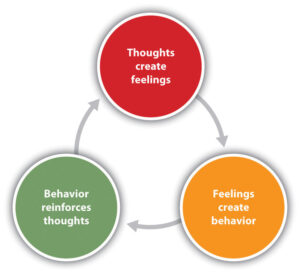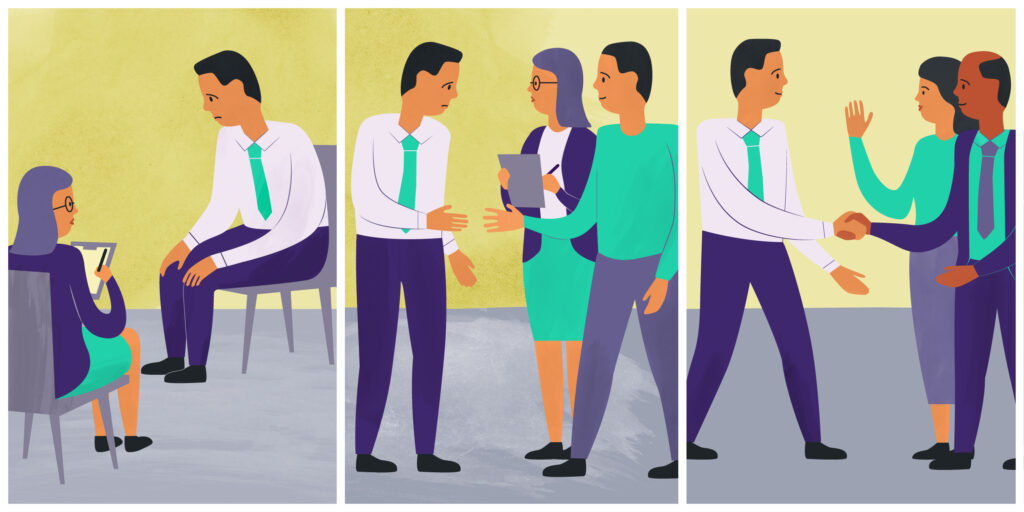Cognitive Behavioral Therapy, often abbreviated as CBT, is a widely recognized and effective approach to treating various mental health issues. Whether you’re dealing with anxiety, depression, phobias, or other emotional challenges, a cognitive behavioral therapist can provide the guidance and support you need to overcome these difficulties. In this article, we’ll explore the world of cognitive behavioral therapy, what a cognitive behavioral therapist does, and how to find one near you.
Contents
- 1 Introduction to Cognitive Behavioral Therapy (CBT)
- 2 Who is a Cognitive Behavioral Therapist?
- 3 The Importance of Finding a CBT Therapist Near You
- 4 Qualities to Look for in a CBT Therapist
- 5 Common Mental Health Issues Treated with CBT Therapist
- 6 The Role of a CBT Therapist in Your Mental Health Journey
- 7 Conclusion
Introduction to Cognitive Behavioral Therapy (CBT)

Cognitive Behavioral Therapy (CBT) is a widely practiced and effective form of psychotherapy that focuses on identifying and changing negative thought patterns and behaviors. It is based on the premise that our thoughts, feelings, and behaviors are interconnected, and by altering dysfunctional thought patterns, individuals can improve their emotional well-being and cope with various psychological issues.
Here’s an introduction to the key principles and components of CBT:
Cognitive Component:
- Cognitive refers to our thoughts and beliefs. In CBT, it is believed that our thoughts play a significant role in our emotions and behaviors.
- CBT helps individuals become aware of their automatic and often distorted thinking patterns, such as negative self-talk, catastrophic thinking, or cognitive biases.
- Clients learn to identify and challenge these irrational or unhelpful thoughts by examining evidence for and against them.
Behavioral Component:
- The behavioral aspect of CBT focuses on identifying and modifying problematic behaviors and reactions.
- Clients work on changing maladaptive behaviors and implementing healthier coping strategies.
- Behavioral techniques, such as exposure therapy or behavioral experiments, are used to help individuals confront and overcome fears or anxieties.
Who is a Cognitive Behavioral Therapist?
A Cognitive Behavioral Therapist (CBT) is a mental health professional who specializes in providing therapy based on the principles of Cognitive Behavioral Therapy. CBT is a widely practiced and evidence-based form of psychotherapy that focuses on helping individuals identify and change negative thought patterns and behaviors that contribute to their emotional distress or mental health issues.
CBT therapists work with individuals to:
- Identify negative thought patterns: They help clients recognize distorted or irrational thoughts and beliefs that may be contributing to their emotional difficulties.
- Challenge and reframe thoughts: CBT therapists assist clients in questioning the accuracy and validity of their negative thoughts and help them replace them with more balanced and realistic thoughts.
- Modify behaviors: They work with clients to develop healthier coping strategies and behaviors, encouraging them to engage in activities that promote positive mental health and well-being.
- Develop problem-solving skills: CBT therapists teach clients how to approach problems and challenges more constructively and adaptively.
The Importance of Finding a CBT Therapist Near You
Finding a Cognitive Behavioral Therapist (CBT) near you can be crucial for several reasons, as proximity to your therapist can significantly impact the effectiveness of your therapy and your overall well-being. Here are some reasons why it’s important to find a CBT therapist near you:
- Accessibility: Having a therapist located nearby makes it more convenient for you to attend regular therapy sessions. You won’t have to deal with long commutes or travel far distances, which can be especially helpful if you have a busy schedule or transportation limitations.
- Consistency: Consistency in therapy is essential for progress. When your therapist is nearby, it’s easier to maintain a consistent schedule of therapy sessions. Regular sessions help build trust and rapport between you and your therapist, which is crucial for effective treatment.
- Emergency support: In case of a mental health crisis or urgent need, having a local therapist means you can potentially access immediate support. They may offer crisis intervention or refer you to appropriate local resources.
- Familiarity with local resources: A therapist who practices in your area may have a better understanding of local mental health resources, support groups, and services that can complement your therapy. They can provide valuable recommendations and referrals when needed.
- Cultural competence: A therapist who is familiar with the local culture and community may better understand your unique cultural background and the context in which you live. This can be especially important in addressing cultural or contextual factors that contribute to your mental health challenges.
Qualities to Look for in a CBT Therapist

When seeking a Cognitive Behavioral Therapist (CBT), it’s essential to find a therapist who possesses the right qualities and qualifications to ensure that you receive effective and supportive treatment. Here are some qualities to look for in a CBT therapist:
- Specialization: Look for a therapist who specializes in CBT or has substantial experience with CBT techniques. Experience in treating the specific mental health condition or issue you’re facing is also crucial.
- Empathy and Compassion: A good therapist should demonstrate empathy, understanding, and genuine care for your well-being. They should create a safe and non-judgmental space for you to discuss your thoughts and feelings.
- Active Listening: Effective therapists are skilled listeners who pay close attention to what you’re saying and ask relevant questions to gain a deeper understanding of your concerns.
- Collaborative Approach: CBT is often a collaborative process, and your therapist should work with you to set treatment goals and develop a treatment plan. They should involve you in decision-making and value your input.
- Adaptability: A good CBT therapist should be able to tailor the treatment to your individual needs and preferences. They should be flexible and open to adjusting their approach when necessary.
- Problem-Solving Skills: CBT therapists are trained to help you develop problem-solving skills. Look for a therapist who can help you identify and address the specific challenges you’re facing.
- Positive Feedback and Encouragement: A supportive CBT therapist should offer positive reinforcement and encouragement. This is when you make progress in therapy or take steps toward positive change.
- Ethical Practices: Ensure that the therapist adheres to ethical guidelines and maintains confidentiality. They should explain their policies regarding confidentiality, informed consent, and the therapeutic process.
- Evidence-Based Practice: CBT is an evidence-based therapy, so your therapist should use techniques and interventions that have been empirically validated for your specific concerns.
Common Mental Health Issues Treated with CBT Therapist
Some of the common mental health issues and conditions that are often treated with CBT therapy include:
- Depression: CBT helps individuals identify and challenge negative thought patterns and behaviors associated with depression. It focuses on changing cognitive distortions and building more adaptive coping strategies.
- Anxiety Disorders: CBT is highly effective in treating various anxiety disorders, including generalized anxiety disorder (GAD), social anxiety disorder, panic disorder, and specific phobias. It helps individuals confront and manage anxiety-provoking situations and thoughts.
- Obsessive-Compulsive Disorder (OCD): CBT, particularly Exposure and Response Prevention (ERP), is a leading treatment for OCD. It involves exposing individuals to their obsessions and preventing compulsive behaviors while learning to manage their anxiety.
- Post-Traumatic Stress Disorder (PTSD): CBT, especially Trauma-Focused CBT (TF-CBT), helps individuals process traumatic experiences, reduce symptoms like flashbacks and nightmares, and develop coping strategies.
- Eating Disorders: CBT is used in the treatment of eating disorders such as bulimia nervosa and binge-eating disorder. It addresses distorted body image, unhealthy eating behaviors, and underlying emotional issues.
The Role of a CBT Therapist in Your Mental Health Journey

Cognitive Behavioral Therapy (CBT) is a versatile and evidence-based approach. It can be used to treat a wide range of mental health issues and emotional difficulties. Some of the common mental health issues and conditions that are often treated with CBT therapy include:
- Depression: CBT helps individuals identify and challenge negative thought patterns and behaviors associated with depression. It focuses on changing cognitive distortions and building more adaptive coping strategies.
- Anxiety Disorders: CBT is highly effective in treating various anxiety disorders, including generalized anxiety disorder (GAD), social anxiety disorder, panic disorder, and specific phobias. It helps individuals confront and manage anxiety-provoking situations and thoughts.
- Obsessive-Compulsive Disorder (OCD): CBT, particularly Exposure and Response Prevention (ERP), is a leading treatment for OCD. It involves exposing individuals to their obsessions and preventing compulsive behaviors while learning to manage their anxiety.
- Post-Traumatic Stress Disorder (PTSD): CBT, especially Trauma-Focused CBT (TF-CBT), helps individuals process traumatic experiences, reduce symptoms like flashbacks and nightmares, and develop coping strategies.
Conclusion
Cognitive Behavioral Therapy offers hope and healing for those struggling with mental health issues. Finding a qualified CBT therapist near you can be the first step toward a brighter future. Remember that seeking help is a sign of strength, and you deserve to live a fulfilling and emotionally healthy life.
Online therapists are increasingly important in today’s world because they provide a convenient and accessible way for people to receive mental health support and treatment. Visit TherapyMantra for an affordable Online Therapy: Book a trial Online therapy session.


